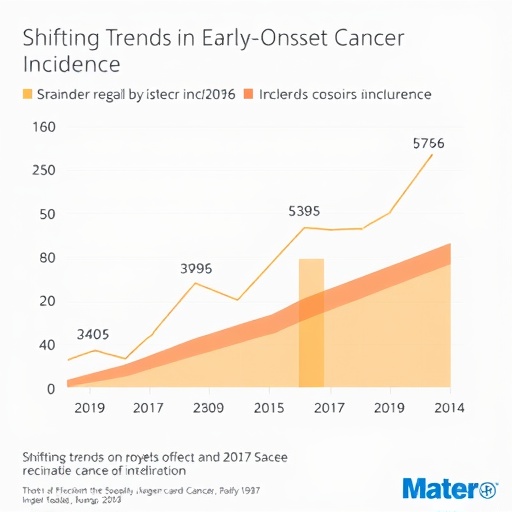The landscape of cancer epidemiology has seen a shift in focus towards early-onset cancers, defined as those diagnosed in individuals under the age of 50. Recent research led by Terashima et al. highlights the diverging global incidence trends of these cancers in a comprehensive study, published in Military Medicine Research. The study emphasizes the urgency of understanding these trends, as they present a critical challenge for public health worldwide in the coming years.
The authors of the study meticulously analyzed data from multiple cancer registries around the globe, drawing comparisons between early-onset and later-onset cancers. The findings reveal a disturbing uptick in the incidence of early-onset cancers, particularly in numerous high-income nations. This upward trend starkly contrasts with the generally stable or declining incidence rates of cancers typically diagnosed at a later stage in life. The data indicates that this divergence is not merely an anomaly but a systemic shift that demands immediate attention and action.
Notably, early-onset cancers have been observed to present differently than their later-onset counterparts, both in terms of their biological behavior and clinical outcomes. The research points out that specific types of early-onset cancers, such as colorectal, breast, and prostate cancers, are experiencing rising rates of diagnosis, with researchers investigating potential genetic, lifestyle, and environmental factors contributing to this alarming rise. Consequently, public health initiatives need to pivot and focus on educational campaigns that provide awareness about these early signs and symptoms.
Mortality trends associated with early-onset cancers have also raised red flags. Terashima et al. report that while treatment options and survival rates for many cancers have improved over the past decades, early-onset cancer patients often face greater challenges. With the increase in diagnosis at younger ages, there is an urgent need for targeted interventions and policy changes to address the unique needs of this demographic. The disparities seen in survival rates highlight a disconcerting gap in healthcare accessibility and cancer research.
In response to these emerging trends, healthcare professionals and policymakers are urged to develop strategies that specifically address the need for early detection and screening in populations at risk for early-onset cancers. The researchers advocate for interdisciplinary collaboration that combines insights from oncology, epidemiology, and public health to devise comprehensive action plans tailored to mitigate the rise of early-onset cancer incidences.
Digital health technologies are also making their mark in combating these trends. As the study notes, increasing access to telemedicine and remote monitoring can prove vital in encouraging at-risk individuals to seek preventative care, while also ensuring timely interventions. These technological advancements offer a promising avenue to bridge gaps in healthcare delivery, particularly for populations that may experience barriers to traditional healthcare settings.
Furthermore, the study calls attention to the importance of conducting research on environmental factors and lifestyle choices that may contribute to the rising rates of early-onset cancers. Factors such as diet, physical activity, and exposure to pollutants are increasingly recognized as playing significant roles in cancer development. Thus, enhancing our understanding of these influences through extensive research endeavors could empower public health campaigns and encourage healthier lifestyle choices aimed at reducing cancer risk among younger individuals.
In light of global health challenges, this burgeoning body of research underscores the importance of understanding how socio-economic factors influence early-onset cancer trends. The authors emphasize that early-onset cancers disproportionately affect younger populations, thus presenting a unique set of physiological and emotional challenges. The need for societal support systems and mental health resources to help these individuals cope with their diagnoses cannot be overstated.
Public health officials are urged to foster grassroots movements supporting cancer awareness, prevention, and research specifically targeting early-onset cases. The hope is that by inciting community engagement, healthier behaviors can be adopted early on, and resources can be allocated to vulnerable populations at risk. This community-based approach could indeed yield positive outcomes in the fight against early-onset cancers.
Moreover, the study raises concerns regarding funding allocations in cancer research. As early-onset cancers rise in incidence, it is critical for funding bodies to prioritize research into these types of cancers, ensuring that a wide array of studies address this emergent problem. Without adequate financial support, researchers may struggle to gather significant data that could lead to breakthroughs and improvements in treatment protocols.
Ultimately, Terashima et al.’s research serves as a clarion call for action. As the landscape of cancer trends evolves, it is imperative for researchers, clinicians, and public health officials to stay vigilant and proactive. Armed with this knowledge, we can work collectively to foster an environment focused on early detection, improved treatment outcomes, and, ultimately, prevention.
In conclusion, this comprehensive analysis of diverging trends in early-onset cancers underscores the need for a multi-faceted approach that includes awareness, research, and community engagement. Only through collaboration across disciplines and sectors can we hope to combat the rising tide of early-onset cancers and protect future generations.
Subject of Research: Diverging global incidence trends of early-onset cancers
Article Title: Diverging global incidence trends of early-onset cancers: comparisons with incidence trends of later-onset cancers and mortality trends of early-onset cancers
Article References: Terashima, M., Nakayama, K., Shirai, S. et al. Diverging global incidence trends of early-onset cancers: comparisons with incidence trends of later-onset cancers and mortality trends of early-onset cancers. Military Med Res 12, 79 (2025). https://doi.org/10.1186/s40779-025-00670-8
Image Credits: AI Generated
DOI: https://doi.org/10.1186/s40779-025-00670-8
Keywords: Early-onset cancers, cancer trends, incidence, mortality, public health, healthcare, environmental factors, lifestyle, research, community engagement.
Tags: biological behavior of early-onset cancersbreast cancer statisticscancer epidemiology researchcancer incidence under 50clinical outcomes of early-onset cancerscolorectal cancer increaseearly-onset cancer trendsglobal cancer registries analysishigh-income nations cancer ratesprostate cancer diagnosis trendspublic health challengessystemic shift in cancer diagnosis





